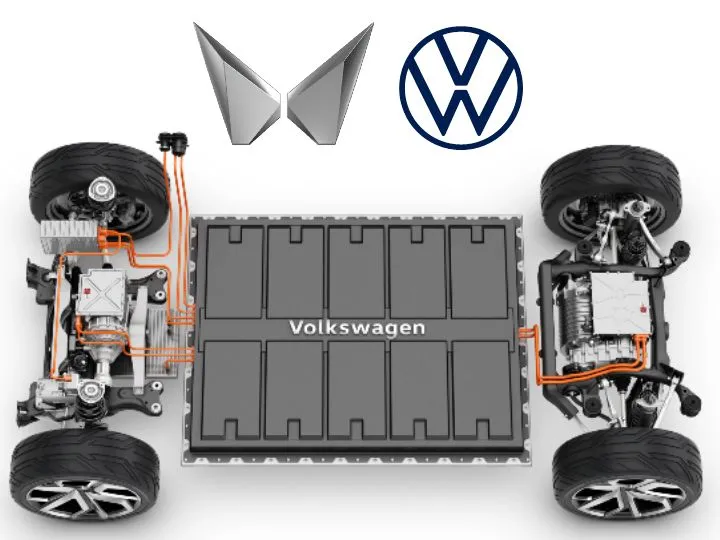
Mahindra Ties Up With Volkswagen for EV Batteries, Automaker Mahindra & Mahindra (M&M) has entered into a technology collaboration agreement with Volkswagen Group to source batteries for its new range of electric vehicles (EVs). This partnership will power Mahindra’s EV expansion plans in India.
Under the agreement, Mahindra will source electric vehicle components from Volkswagen’s MEB electric platform. The MEB platform includes the battery system, electric motors, power electronics, and charging components.
Mahindra is aiming to electrify its passenger and commercial vehicles portfolio over the next few years. The Volkswagen partnership provides Mahindra access to proven EV components which can help accelerate its EV launch timelines.
The tie-up was announced on Friday at Mahindra’s new EV center of excellence called Mahindra Advanced Design Europe (MADE) located in the West Midlands, UK. The MADE center will drive Mahindra’s EV ambitions in global markets.
Also Read – Ola Electric Cuts E-Scooter Prices Amid Slowing Demand
Mahindra MD Pawan Goenka said, “We aim to be among the largest electric vehicle companies globally through electric SUVs, shared mobility, and last-mile mobility solutions. Our partnership with Volkswagen and the creation of MADE will firmly anchor Mahindra in this electric future.”
Powering Mahindra’s EV Lineup
Mahindra plans to launch its first electric SUV named XUV400 in 2023-24. The MEB components from Volkswagen will be utilized in the XUV400 EV and other future electric models from Mahindra.
The partnership provides Mahindra access to Volkswagen’s mature EV technology and synergies between the two automakers. Mahindra aims to equip its future EVs with long-range, fast-charging capabilities and strong performance.
“Our cooperation with Mahindra represents an important step forward in accelerating electric mobility in India. We aim to cooperate with strong, local partners as part of our growth strategy,” said Thomas Schmall, CEO of Volkswagen Group.

Mahindra is targeting tall EV adoption goals with plans to have EVs account for 20-30% of its total monthly sales within the next 2-3 years. The automaker views EVs as the future of mobility globally.

EV Push in India
The Mahindra-Volkswagen partnership comes at a time when the Indian government is strongly pushing for EV adoption through policies like the FAME-II scheme, PLI schemes, battery swapping policy, etc.
Automakers in India are working on expanding their EV product lineup to tap into the opportunities in this growing segment. Tata Motors, MG Motors, and Hyundai are some companies committing big investments into their EV plans.
Mahindra is aiming to be among the EV leaders leveraging its strong brand reputation and networks. Offering advanced EV technology through global tie-ups is a key strategic focus for the automaker.
Also Read – Tesla Soon in India, Government Close to Finalising Concession on Import Duties for EVs
The Volkswagen partnership validates Mahindra’s EV vision and could make it a formidable player in the electric mobility space. According to industry forecasts, EV sales penetration in India could reach 30% by 2030 driven by new product launches and declining battery prices.
“Our partnership with Volkswagen and the creation of MADE will firmly anchor Mahindra in the electric future.” – Pawan Goenka, MD, Mahindra & Mahindra
“We aim to be among the largest electric vehicle companies globally through EVs, shared mobility, and last-mile mobility solutions.” – Pawan Goenka, MD, Mahindra & Mahindra
“Our cooperation with Mahindra represents an important step forward in accelerating electric mobility in India.” – Thomas Schmall, CEO, Volkswagen Group







